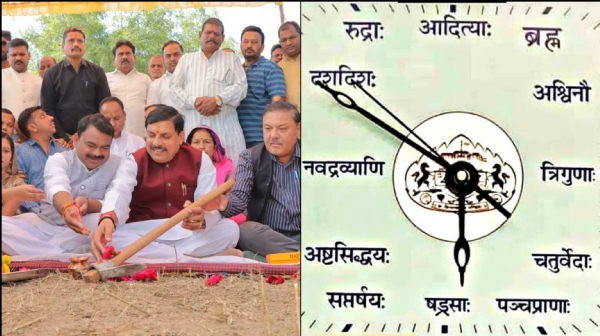World's first Vedic clock to be installed in Ujjain, foundation stone laid! Know how Vedic clock works-
World"s first Vedic clock mega project is being taken up by the MP state government at an estimated cost of Rs 1.62 crore as the state government is working to restore the ancient glory of Ujjain.
Total Views |
Ujjain, Nov 7: Madhya Pradesh’s Ujjain, the city of Mahakal will soon boast the world’s first Vedic clock which will be synced with the position of the Sun. This came after state higher education minister Mohan Yadav on Sunday laid the foundation stone at the 300-year-old Jiwaji Observatory in Ujjain. The observatory was constructed by Maharaja Sawai Raja Jaisingh of Jaipur in 1719.

The mega project is being taken up by the state government at an estimated cost of Rs 1.62 crore as the state government is working to restore the ancient glory of Ujjain. The minister said the (Vikramaditya) Vedic clock will be divided into 24 muhurats (hours).
Speaking to the media, Yadav said that it is aimed at making people familiar with the Indian (Vedic) time calculation. "A special thing about this Vedic clock is that it will be based on Vedic calculation of the time, in which the 24 hours of the day are divided into Muhurats. The Vedic clock will be synced with the position of the Sun and also with the sunrise and sunset timings at different places across the world," the minister said.
He said that there will be a dedicated mobile application for the readings of the Vedic Clock, and citizens will be able to use it on their smartphones, computers, televisions, and other devices. The Vedic Clock's background graphics will depict Jyotirlingas, Navagrah, etc.
"The application will also have information on Vedic Hindu Panchang, planetary positions, muhurat, astrological calculation, and predictions, etc," said Yadav, while adding that Ujjaini (the ancient name of Ujjain) holds great importance in the world in terms of time and geographical calculations, and this Vedic Clock is one of the efforts taken up by the government to bring the ancient glory of Ujjain.
How does Vedic Clock works?
This clock, in the place of 1 to 12, respectively – Brahma, Ashwinu, Triguna, Chaturveda, Panchapranaah, Shadrasaah, Saptarsayah, Ashtasiddhayah, Navadravyani, Dashadishah, Rudraah and Adityaah are written.
Out of these, 12 Adityas, 11 Rudras, 8 Vasus and 2 Ashwini Kumars are counted among the famous 33 koti of god's (deities) of Sanatan Dharma.
1. Brahma: Brahma is written in place of 1:00 o’clock, it means that Brahm is one and no one else – Ekobrahmdvityo nasti.
2. Ashwinu: Ashwinu is written in place of 2:00. Ashwini Kumar has two sons- Nasatya and Dastra. Nasatya represents sunrise and Drastya represents sunset.
3. Triguna: In place of 3:00 pm, it is written Triguna which means that there are three types of Gunas – Satoguna, Rajoguna and Tamoguna. Jiva and Prakriti are of three gunas.
4. Chaturveda: At the place of 4:00, Chaturveda is written, which means that there are four types of Vedas – Rigveda, Yajurveda, Samaveda and Atharvaveda. Vedas are the scriptures of Hindus and no other scripture.
5. Panchaprana: At the place of 5 o’clock it is written Panchapranah, which means that there are five types of Prana – Apana, Samana, Prana, Udana and Vyana. There are mainly five types of prana in the body.
6. Shadrasa: At the place of 6:00, it is written Shadrsa: It means that there are 6 types of rasa – sweet, amal, salt, bitter, tikta and kasaya.
7. Saptarshayah: In the place of 7:00, it is written Saptarshaya: It means that there are 7 sages – Kashyapa, Atri, Bharadwaja, Vishwamitra, Gautam, Jamadagni and Vashistha. There have been different Sapta Rishis in each era.
8. Ashtasiddhaya: In place of 8:00, it is written Ashta Siddhi: It means that there are eight types of Siddhis – Anima, Mahima, Laghima, Garima, Prapti, Prakamya, Ishitva and Vashitva.
9. Navdravyani: Navdravyani is written at the place of 9:00, which means that there are 9 types of funds – Padma, Mahapadma, Neel, Shankha, Mukunda, Nanda, Makar, Kachhap, Kharva.
10. Tenth: Dashdishah is written in the place of 10:00 o’clock, which means that the directions are 10 – East, West, North, South, Ishaan, Southwest, Vayavya, Agneya, Akash, Patal.
11. Rudra: In the place of 11:00 o’clock Rudra is written, it means that there are 11 types of Rudra- Kapali, Pingal, Bhima, Virupaksha, Vilohit, Shasta, Ajapada, Ahirbudhnya, Shambhu, Chand and Bhava. This is the form of God Shiva.
12. Aditya: At the place of 12:00 it is written Aditya: meaning that there are 12 types of Suns – Anshuman, Aryaman, Indra, Tvashta, Dhatu, Parjanya, Pusha, Bhaga, Mitra, Varuna, Vivasvan (Sun) and Vishnu (Vaman). He is the son of sage Kashyapa and Atiti who are gods.

